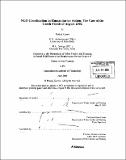| dc.contributor.advisor | JoAnn Carmin. | en_US |
| dc.contributor.author | Kumar, Pankaj, 1979- | en_US |
| dc.contributor.other | Massachusetts Institute of Technology. Dept. of Urban Studies and Planning. | en_US |
| dc.date.accessioned | 2006-06-19T17:36:24Z | |
| dc.date.available | 2006-06-19T17:36:24Z | |
| dc.date.copyright | 2005 | en_US |
| dc.date.issued | 2005 | en_US |
| dc.identifier.uri | http://hdl.handle.net/1721.1/33056 | |
| dc.description | Thesis (M.C.P.)--Massachusetts Institute of Technology, Dept. of Urban Studies and Planning, 2005. | en_US |
| dc.description | Includes bibliographical references (p. 56-59). | en_US |
| dc.description.abstract | In responding to disasters and emergencies, it is generally expected that there is effective coordination and exchange of information among those affected by or involved in the disaster response at the national and international level and that relief agencies undertake activities on the basis of need, where their expertise and capacity can have the greatest impact. Benefits of coordination range from reducing activity duplication to allowing organizations to assist more people in need. However, while the importance of coordination is generally accepted and appreciated in the humanitarian aid field, how to accomplish it still remains somewhat elusive and problematic. This thesis attempts to analyze the nature and level of coordination among Czech humanitarian NGOs responding to the devastating floods of 2002 with a view to better understand the challenges to and incentives for NGO coordination in humanitarian action and response. The results show that while an ad-hoc attempt was made to coordinate the rehabilitation effort among the NGOs, differences in management styles and organizational values, along with traditional disincentives to cooperate like competition for funds and publicity limited the level of coordination in responding to the floods. | en_US |
| dc.description.statementofresponsibility | by Pankaj Kumar | en_US |
| dc.format.extent | 59 p. | en_US |
| dc.format.extent | 4225229 bytes | |
| dc.format.extent | 4226742 bytes | |
| dc.format.mimetype | application/pdf | |
| dc.format.mimetype | application/pdf | |
| dc.language.iso | eng | en_US |
| dc.publisher | Massachusetts Institute of Technology | en_US |
| dc.rights | M.I.T. theses are protected by copyright. They may be viewed from this source for any purpose, but reproduction or distribution in any format is prohibited without written permission. See provided URL for inquiries about permission. | en_US |
| dc.rights.uri | http://dspace.mit.edu/handle/1721.1/7582 | |
| dc.subject | Urban Studies and Planning. | en_US |
| dc.title | NGO coordination in humanitarian action : the case of Czech floods of August 2002 | en_US |
| dc.title.alternative | Non-Governmental organization coordination in humanitarian action | en_US |
| dc.type | Thesis | en_US |
| dc.description.degree | M.C.P. | en_US |
| dc.contributor.department | Massachusetts Institute of Technology. Department of Urban Studies and Planning | |
| dc.identifier.oclc | 62122107 | en_US |
